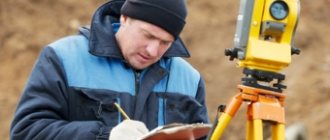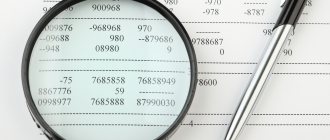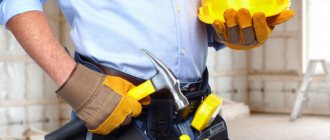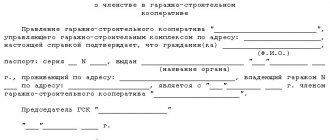A forensic construction expert is a specialist who is hired to answer questions posed by the court and the participants in the process. Forensic examination is needed if the consideration of a case requires special knowledge in science, technology, and other fields of activity. One of the common types of research is construction and technical expertise. Its subject may be assessing the quality of construction and repairs, checking the validity of estimates and calculations, and calculating the damage caused. Expertise is carried out by specialists (experts) and organizations that are members of the SRO.
Read in the material how construction and technical expertise is carried out as part of a trial, how to correctly determine the subject of the study and pose questions, where to find an expert for the court.
What is construction and technical expertise in the Russian Federation
Expertise involves research on certain issues. The purpose of expert research may be objects and things, real estate, payment, settlement and other documents, the quality of work or services. Forensic examination of construction projects, works and documents is one of the areas of research. Its essence is as follows:
- a forensic construction examination is required if special knowledge of specialized specialists is needed to make a decision;
- participants in the case can order expert research on their own initiative, or file a corresponding petition in the process;
- the court may order an examination on its own initiative, and the parties will be able to prepare questions for research.
The production of forensic construction and technical examinations includes the study of documents and case materials, inspection of objects, work with estimates and calculations. To check the quality of work, services, materials and structures, tests, tests, and measurements can be carried out. Based on the results of the research, the expert must give accurate, objective and reasoned answers to all questions posed. If this is not possible, the expert must justify such reasons in his opinion or report.
Dear Clients!
The information in this article contains general information, but each case is unique. You can get a free consultation from our engineers using one of our telephone numbers - call:
8 Moscow (our address)
8 St. Petersburg (our address)
All consultations are free.
Expert commentary. Depending on the circumstances of the case, an independent or state construction and technical examination may be carried out. In both cases, experts are responsible for the completeness and reliability of their findings and conclusions. The difference between them lies in the powers of public and private experts, and some subjects of research.
An expert can prepare an opinion on the questions raised, speak in court and give explanations.
Regulatory acts
A forensic construction expert selects regulations to suit the purposes of the research. But there are also general guidance documents that apply to any type of examination:
- Civil Procedure Code of the Russian Federation, Arbitration Procedure Code of the Russian Federation, Code of Criminal Procedure of the Russian Federation - these codes regulate the procedure for legal proceedings, including in terms of conducting examinations;
- Federal Law No. 73-FZ () - contains requirements for state examination, organizations and specialists;
- Town Planning Code of the Russian Federation (), SP, GOST, SNiP, other regulations and by-laws in the field of construction.
Working as a construction expert involves the use of special research techniques and professional equipment. They are selected according to the subject of examination and the questions posed. For example, different methods are used to study estimates and assess the quality of building materials during repairs. The expert will indicate a list of standards and methods, as well as the rationale for their choice, in the text of the conclusion.
Forensic construction expert. Questions to the expert.
Evgeny A.
Expert in the field of certification, cadastre, real estate and design. Higher legal education, more than 10 years of work experience.
Ask a Question
Question to the expert
Hello! Can I find an expert for the trial myself? Can the court reject the nomination and appoint another expert?
The issue of choosing an expert and appointing an examination is decided at a court hearing. If an expert has a qualification certificate, the court cannot arbitrarily refuse to involve him in the examination. But the expert’s specialization will also be checked so that he can give answers to the questions posed.
How long can the examination take? If an expert delays issuing a report, can the court refer the questions to another specialist?
The period for conducting the examination cannot exceed 45 days. But for good reasons, the expert may apply to extend this period. Exceptional circumstances are required to transfer materials to another expert.
After the trial is completed, can I get a copy of the expert report on the property from the case?
Yes, participants in the process can receive not only copies, but also originals of documents previously submitted to the case file. The original expert report usually remains in court, but they are required to give you a copy.
If the expert did not answer 2 questions specified in the court ruling, is it possible to attract another specialist? Thank you in advance.
If the expert does not answer all the questions posed, an additional examination may be assigned. If necessary, other specialists may be involved in its implementation.
The OMEKS company conducts the following types of independent and forensic examinations:
1. Construction technical and engineering expertise;
- Study of buildings and structures for compliance with the RULES FOR INSPECTION OF BEARING STRUCTURES OF BUILDINGS AND STRUCTURES SP 13-102-2003;
- Determination of the volume and cost of work performed on project documentation;
- Determining compliance of project documentation with current rules and standards;
- Analysis of the technical condition of buildings and structures;
- Analysis of completed repair and installation work in accordance with current rules and standards;
- Determination of the cost of restoration of buildings as a result of damage caused.
- Determining the degree of deterioration of housing/suitability of housing for habitation.
- Determining the causes of apartment floods and water supply system failures.
- Examination of the quality of construction work carried out (quality of repairs)
- Examination of the cost of eliminating defects in construction work.)
- Examination of the quality of installation of PVC windows.
- Examination of the quality of door installation.
Examination of the technical condition of buildings and structures
Inspection of buildings and structures is a procedure for checking structures for actual technical condition and preservation of operational properties. The assessment is carried out to monitor the condition and identify the need for repairs or restoration work. The technical inspection of buildings and structures should not be confused with the examination of the industrial safety of buildings. The latter is carried out at facilities associated with hazardous production and is subject to mandatory registration with Rostekhnadzor.
The need for an examination may arise for various reasons. Acquiring ownership of any building involves investing a large sum. A preliminary inspection of the condition of the building will help to obtain an objective understanding of its technical condition and will save you from additional waste of time and money in the future. In this case, it is possible to determine the degree of physical deterioration of the entire building or individual structural elements and establish the actual cost of the object.
A complete inspection of buildings and structures includes three interrelated stages: preparation, visual inspection and detailed inspection. In some cases, it is enough to carry out the first two stages, since the latter involves the use of special equipment and, therefore, additional financial costs. The need for a detailed examination is determined by a specialist and prescribed if a visual examination could not fully identify all problems.
To examine the structure more thoroughly and effectively, a thermal imager is used - special diagnostic equipment that detects changes in temperature levels. With its help, you can detect defects hidden from view and perform an analysis of faults in building structures. The operation of this device is based on capturing images in infrared rays.
During the preparation, the specialist familiarizes himself with the object itself, design and as-built documentation and all available records of previously carried out repair or reconstruction work, as well as previous inspections. Studying the documents allows you to obtain information about the time of design and construction, construction technologies, materials used, possible deviations and changes to the design, data on operating conditions and defects and damage that appeared during its operation. If the necessary documentation is not available, measurements are taken and a drawing is created. Based on the received technical specifications, a work program is drawn up.
A visual inspection includes an inspection of the entire building and individual structural elements. In this case, measuring instruments and tools are used. A description of the identified problems is compiled with recommendations for eliminating them. If a visual inspection reveals significant damage that reduces the strength of the structure and individual elements, or the impossibility of fully examining the structures, a detailed examination is recommended. Special equipment is used for this, and samples of building materials are taken for laboratory study.
Objects of construction expertise All those objects that relate to the implementation of the project can be subject to expert research. These may be: documentation of the investment and construction project, which includes an estimate with a list of materials used in construction; data obtained as a result of engineering and geodetic surveys; plots of land; communication systems; unfinished construction projects; ready-made construction projects, such as bridges, roads, residential and industrial buildings, overpasses, etc. Methods of construction expertise As in any activity, various methods of construction and technical expertise are used in the study of various objects. This allows you to effectively obtain the necessary data, regardless of the object of examination, the complexity of the work being carried out and the questions to which the correct answer must be found. These methods include:
- Technical and legal examination of various documentary media, as a result of which an assessment is made of the extent to which all provisions of the engineering project comply with the estimate or agreement, current standards and generally accepted principles;
- A comprehensive inspection of the construction site, which is carried out to record pronounced defects;
- Carrying out the necessary measurements; ultrasonic flaw detection, thermal imaging assessment, examination of materials with penetrating compounds, and other methods that relate to non-destructive testing methods;
- Studies of various samples taken directly at the site, which are carried out in laboratory conditions; mechanical impact on some areas of structures and buildings;
- Placing beacons in difficult and problem areas to identify formed cracks;
- Study of individual elements of buildings, structures, such as foundations, roofs, floors, walls, etc.;
- Research of land plots, which includes analysis of landscape faults, soil characteristics and groundwater.
Stages of technical examination of construction projects All construction and technical examination work can be divided into three stages.
- At the first stage, the building materials used and design documentation are studied and analyzed.
- At the second stage, reconnaissance takes place with a visit to the site. Specialists conduct a direct inspection at the construction site itself.
- At the third and final stage, the data obtained after the first and second stages are summarized. As a result of this generalization, an expert opinion is drawn up.
Any expert conclusion that is in doubt can be challenged at the request of one of the project participants. As a result, a re-examination may be ordered. The difference in the data obtained between the first and second studies may be grounds for verification or initiation of criminal proceedings against the specialists who made the conclusions. At the first stage, when materials and documentation are studied and analyzed, the expert begins his work with an analysis of the documents transferred to him. He must determine whether it is sufficient and adequate to carry out the required research. If any party that was notified of the date of the examination does not appear at the place where it will be carried out, this is not a reason for postponing the examination. An act or protocol is simply drawn up, which reflects the fact of failure to appear, and in which other persons record this fact with their signatures. During the research, a specialist can interview participants and witnesses to obtain the necessary explanations and comments. He can use in his activities only serviceable tools and devices that have the necessary resolution. If during the research conducted no answers were received to the questions posed to the examination, then the specialist who conducts it must apply for additional measures, such as opening the finishing coatings, tearing off pits and others.
How is an expert opinion drawn up?
After the first two stages, the expert receives information with data from the research conducted. Based on these studies and the results obtained, the specialist makes a written conclusion, which he signs with his own hand. In some cases, this conclusion is made by a commission of experts. In this case, each member of the commission signs this document. These signatures must be certified by the seal of the expert organization. The drawn up conclusion of the construction and technical examination is necessarily based on provisions that make it possible to verify the validity and reliability of the recorded conclusions, which is carried out on the basis of generally accepted scientific and practical information. The expert report reflects the following information: when and where the examination was carried out, the exact time and place; what served as the basis for the examination; information about the person who ordered the examination; information about the expert organization and the expert himself, his last name, first name, patronymic, what education he has and his specialty, etc.; information that the expert has been warned of liability, including criminal liability; a list of questions that the specialist must answer; what research objects and documents are submitted for research; data about those participants who were present at the research site; what methods were used during the examination; research results and their evaluation; justification and formulation of conclusions that should answer the questions posed to the specialist; materials that illustrate the expert’s conclusions, which are attached to the conclusion and serve as its integral part. Those documents that record the progress with the conditions and results of the research conducted remain for storage in the expert organization. They are provided for inclusion in the case at the appropriate request of the body or person who appointed the examination.
When is forensic construction and technical expertise needed?
Construction expertise, as determined by the court, can be appointed on the following issues:
- assessment of compliance of design, technical and other documentation with laws, regulations, standards;
- forensic construction examination of buildings and structures (for example, to assess the degree of readiness, determine the causes and nature of damage);
- assessment of damage caused by poor-quality work and unauthorized construction;
- examination of the quality of materials and structures supplied under the contract or used during construction;
- examination of documents for authenticity and correspondence of signatures.
Naturally, this is not a complete list of questions that can be posed to an expert. The subject of an expert assessment can be any real estate object, from buildings and structures to premises and garages.
| No. | Types of construction expertise | Goals and subject of research |
| 1 | Construction and technical expertise | It is carried out to determine the legality of the construction of the facility, compliance with building codes and safety regulations, to determine the characteristics and nature of damage, to determine the quality and volume of work performed under the contract, design documentation, and estimates. |
| 2 | Examination of the value of the object, assessment | Includes checking the objectivity of initial estimates and calculations, compliance with declared and market prices, checking the validity of payment and reporting documents submitted by the contractor, and analysis of calculations. |
| 3 | Expertise to assess damage | Carried out within the framework of criminal or civil cases, it allows you to determine the amount of damage caused to the owner, tenant or other owner of the property. |
| 4 | Examination of the quality of materials and structures | Allows you to evaluate the quality of materials and structures supplied under the contract or used during construction. |
Construction Expertise Methods
As in any activity, various methods of construction and technical expertise are used in the study of various objects. This allows you to effectively obtain the necessary data, regardless of the object of examination, the complexity of the work being carried out and the questions to which the correct answer must be found. These methods include:
- technical and legal examination of various documentary media, as a result of which an assessment is made of the extent to which all the provisions of the engineering project comply with the estimate or agreement, current standards and generally accepted principles;
- a comprehensive inspection of the construction site, which is carried out to record pronounced defects;
- carrying out the necessary measurements;
- ultrasonic flaw detection, thermal imaging assessment, examination of materials with penetrating compounds, and other methods that relate to non-destructive testing methods;
- studies of various samples taken directly at the site, which are carried out in laboratory conditions;
- mechanical impact on some areas of structures and buildings;
- placing beacons in difficult and problem areas to identify formed cracks;
- study of individual elements of buildings and structures, such as foundations, roofs, floors, walls, etc.;
- studies of plots of land, which includes analysis of landscape faults, soil characteristics and groundwater.
Over time, these methods have been improved. The advent of the computer and related software made it possible to resort to methods such as computer modeling. It is carried out using specially developed programs, such as SCAD, which allow for construction and technical examination of structures. For example, calculate different loads, how reliable the components and connections used are, how strong the structure is and the optimal angles.
Types of forensic examinations in construction
In order for a construction forensic expert to begin an investigation, it is important to determine the subject of the investigation. This is done by the court or the initiator of ordering the expert opinion. Below we will talk about the main types of examinations. associated with special knowledge in construction, cadastre and real estate.
Forensic examination of construction works and objects
The need to conduct an examination of an object or construction work may be associated with the legalization of unauthorized construction, a dispute between the customer and the contractor, or the inability to undergo cadastral registration and registration. Expert studies can be ordered on the following issues:
- examination of the structure for the court to determine the legality of the construction of the facility, compliance with building codes and safety regulations;
- technical and forensic examination of the building to determine its characteristics and the nature of damage;
- research on the quality and volume of work performed under the contract, design documentation, estimates;
- independent examination of building materials and structures, their compliance with regulations, contract terms, and design documentation.
The procedure for conducting a judicial construction and technical examination
The practice of forensic construction and technical examination may differ for different types of studies. However, the algorithm for its implementation will be the same, as it is prescribed in codes and laws. Below he will tell you about the main stages of expert activity and the rules for drawing up conclusions.
Selecting an expert organization
The plaintiff or defendant in court can independently choose an expert organization and indicate its details in the petition. If the initiator of the examination is a court, it will select an organization from the accredited list. In large cities there are institutions, bodies and centers of forensic construction and technical expertise, so there will be no problems with the choice. If the object of expert research is not located at the organization’s location, the customer pays additional travel expenses.
List of useful documents
Documents for download:
| No. | Document | Link |
| 1 | Sample terms of reference for conducting an examination | |
| 2 | Sample petition to the court for an examination | |
| 3 | Sample application for examination | |
| 4 | Sample certificate of inspection of hidden structures for examination | |
| 5 | Review of judicial practice on construction expertise | |
| 6 | Sample expert report on object assessment | |
| 7 | Guidelines for conducting examinations and assessments of objects | |
| 8 | Sample technical report |
Difference from independent construction expertise
Construction expertise can be judicial and independent. Let's first differentiate between these two types.
If we are talking about forensic examination, Federal Law 73 says that it can only be appointed by a certain circle of persons representing government agencies, for example, a judge, a law enforcement officer, or the prosecutor's office.
Any individual or legal entity has the right to appoint an extrajudicial (independent) construction examination of real estate. This is often done when a person does not want to bring the case to court or, conversely, he needs grounds to open a case.
If both examinations are carried out during the consideration of the case, the court will take into account the conclusions of the forensic examination.
The purpose of forensic examination is to assist the court or prosecutor's office in uncovering case materials.
How much does construction and technical expertise cost?
The cost of conducting a technical examination depends on its type, subject and objects of research, the list of questions posed; the costs of the examination are borne by the initiator of the petition. Once the process is completed, costs can be recovered from the losing party. If an expert study is ordered at the initiative of the court, the costs are paid from the budget, but are subsequently distributed between the parties. Preliminary prices for construction and technical expertise in Moscow can be found in the table below.
| No. | Service, document | Price |
| 1 | Expertise for court | from 35,000 rub. (depends on the purpose and subject of research, the list of questions for the expert) |
| 2 | Independent assessment of the property | from 38,0000 rub. |
| 3 | Conclusion of a cadastral engineer for the court | from 43,000 rub. |
| 4 | Support of litigation in the field of construction, cadastre, real estate | from 50,000 rub. |
| 5 | Conclusion to legitimize self-construction | from 100,000 rub. |
Requirements for an expert, quality of his work
Today, there is only one document in the legislative norms that clearly regulates the requirements for experts, as well as the procedure for conducting construction and technical expertise: F3 No. 73 “On conducting construction and technical expertise in the Russian Federation .
Based on this document, an expert can be a citizen of the Russian Federation who has graduated from a higher educational institution and, according to his specialty, has every right to occupy such positions.
The qualifications of experts are confirmed by a special commission, on the basis of which a conclusion is made on granting the right to conduct such procedures.
An expert must confirm his qualifications every 5 years .
In addition, candidates who meet the basic conditions are considered for the position of expert, namely:
- 4 years of experience in management positions in the construction industry;
- presence of higher specialized education;
- the presence of high moral and personal qualities.
In practical activities, the expert’s responsibilities are as follows:
- ensuring the veracity of inspection results;
- complete confidentiality during the examination process, including its result;
- goodwill, balance and other manifestations of one’s qualities;
- exert any influence on attempts to stop the examination process in any way.






